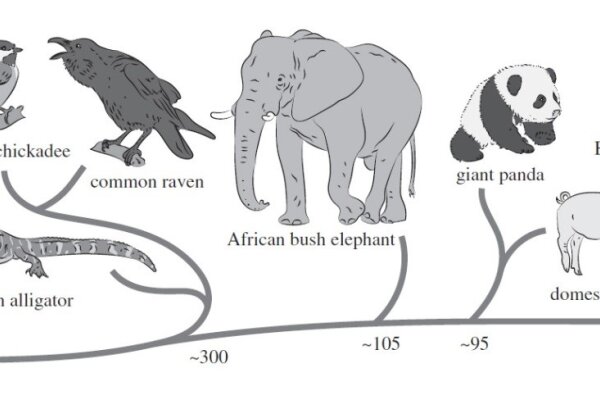2017-07-21

Writing over a century ago, Darwin hypothesized that vocal expression of emotion dates back to our earliest terrestrial ancestors. If this hypothesis is true, we should expect to find cross-species acoustic universals in emotional vocalizations. Previous studies suggest that acoustic attributes of aroused vocalizations are shared across many mammalian species, and that humans can use these attributes to infer emotional content. But do these acoustic attributes extend to non-mammalian vertebrates? In this study, a group of philosophers from Brussels and Bochum, Biopsychologists from Bochum and many animal vocalization specialists from all over the world asked human participants to judge the emotional content of vocalizations of nine vertebrate species representing three different biological classes—Amphibia, Reptilia (non-aves and aves) and Mammalia (see picture to get to know the animals used and to gain insight about their phylogenetic distance to humans in years). They found that humans are able to identify higher levels of arousal in vocalizations across all species. This result was consistent across different language groups (English, German and Mandarin native speakers), suggesting that this ability is biologically rooted in humans. Our findings indicate that humans use acoustic parameters that indicate a shift to higher frequencies to identify higher arousal vocalizations across species. These results suggest that fundamental mechanisms of vocal emotional expression are shared among vertebrates and could represent a homologous signalling system. This study attracted a huge amount of attention from media across the globe and even made it to the news outlet of the Science magazine (http://www.sciencemag.org/news/2017/07/can-you-tell-whether-frog-excited-just-listening-its-voice).

Writing over a century ago, Darwin hypothesized that vocal expression of emotion dates back to our earliest terrestrial ancestors. If this hypothesis is true, we should expect to find cross-species acoustic universals in emotional vocalizations. Previous studies suggest that acoustic attributes of aroused vocalizations are shared across many mammalian species, and that humans can use these attributes to infer emotional content. But do these acoustic attributes extend to non-mammalian vertebrates? In this study, a group of philosophers from Brussels and Bochum, Biopsychologists from Bochum and many animal vocalization specialists from all over the world asked human participants to judge the emotional content of vocalizations of nine vertebrate species representing three different biological classes—Amphibia, Reptilia (non-aves and aves) and Mammalia (see picture to get to know the animals used and to gain insight about their phylogenetic distance to humans in years). They found that humans are able to identify higher levels of arousal in vocalizations across all species. This result was consistent across different language groups (English, German and Mandarin native speakers), suggesting that this ability is biologically rooted in humans. Our findings indicate that humans use acoustic parameters that indicate a shift to higher frequencies to identify higher arousal vocalizations across species. These results suggest that fundamental mechanisms of vocal emotional expression are shared among vertebrates and could represent a homologous signalling system. This study attracted a huge amount of attention from media across the globe and even made it to the news outlet of the Science magazine (http://www.sciencemag.org/news/2017/07/can-you-tell-whether-frog-excited-just-listening-its-voice).